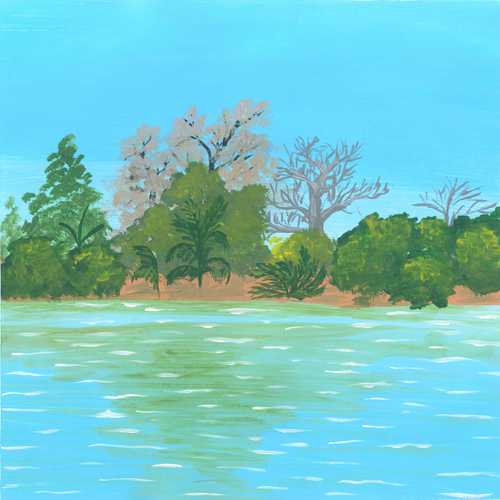
Halò*, friend. 👋
How can a nature sound recordist approach invasive human-generated sounds – and should they? How does the most arid region on Earth sound? What words can articulate our feelings about the climate emergency? What effects is the Russo-Ukrainian War having on the area’s wildlife?
Read on to find out.
*“Hello” in Scottish Gaelic.
Soundscape of the week
‘Seal Vocalization in Mingulay’:
What do seals sound like? Every so often, recordings can highlight gaps in our knowledge of the natural world. Brassy honks, sounds like a blunt wood saw, and – let’s face it – comedy fart noises may not be what most people would have in mind, yet the very inelegance of the calls in this recording is highly endearing.
“Recorded whilst at anchor off the sheltered east coast of Mingulay, one of the most southerly islands of the Outer Hebrides, Scotland […] [this soundscape documents its] large grey seal population [in] late September during their breeding season”. This seal species’ underwater calls are described as “humming, moaning, and yodeling”, “growls and throaty ‘rups’”, and include pulsed sounds or clicks “emitted at rates of 70-80 pulses/sec”.
To lower the tone, gray seals (Halichoerus grypus, which translates to “hook-nosed sea pig”, suggesting a naturalist with an ax to grind) can also mimic human speech and songs – including the Star Wars theme tune (kind of). Move over, John Williams.
Articles and essays
🎙️ “As human populations increase, the natural quiet goes away.”
‘Noise and Field Recording’, by sound recordist, photographer, and expedition leader George Vlad, explores the relationship between recordists and ‘unwanted’ sound.
He reminisces about the first time he “listen[ed] to the world through microphones, [which made] all of the content that my brain wasn’t registering became painfully apparent. I was in a semi-urban park and I could hear birds singing, soft wind in the trees, and ducks in a pond, but listening through headphones added to the mix vehicle engines, aircraft, and people playing football nearby.”
Expanding upon the anthropophony which is increasingly impinging upon supposedly wild spaces like sub-Saharan savanna and the rainforests of the Amazon, Borneo, and Madagascar, he considers the difficulties of dealing with these sources of noise even-handedly and the implications of separating human activity from the natural world.
🌵 The current episode of Wind Is the Original Radio, the earth.fm podcast, also features George’s work: the blustery ‘Atacama Desert Wind’ evocatively conjures up the region’s desolate environmental harshness and extreme aridity.
Away from touristy areas with their associated noise, “the dusty and rocky plateau is the perfect location to record wind”. Just don’t expect to hear the fauna which subsists in the areas of the Atacama which aren’t too extreme to support plant or animal life; its populations of vicuñas, llamas, rheas, or Humboldt penguins “were all eerily quiet”.
Further episodes are available on Apple and Google podcasts, Spotify, and Stitcher, with new installments released every Friday.

From the extended community
🦌 In addition to the “grim human statistics, Ukraine is also counting the toll on its wildlife” – which represents a third of European biodiversity, despite the country making up just 6% of the continent. ‘Ukraine War Is Killing Wildlife’ examines this overlooked consequence of the ongoing Russian invasion, from the conflict’s effects on Black Sea dolphins, to the damage done to more than half of the country’s forests, to 600,000 hectares of biodiverse wetland, and to the grassland ecosystem of the Kamianska Sich National Park, which was mined by retreating Russian forces – as well as “pollution of soil, air and water by military equipment, toxic chemicals and emissions from fires”.
The Ukrainian Ministry for Environmental Protection and Natural Resources is recording the cost of pollution, which has so far been estimated at €37.8 billion, with the intention that Russia pays reparative compensation for damage caused, including to the environment.
🔤 “Anger is certainly justifiable, given the multi-million dollar campaign by fossil fuel companies to convince the public that there are very fine scientists on both sides of the debate and forestall regulations, even decades after their own scientists acknowledged the problem with their pollution. We don’t need new vocabulary to deal with profit-driven corruption, but we do need some new language for the feelings this destruction has wrought.”
Still relevant five years on, Daily Kos’ 2018 article ‘Climate Feelings: Solstalgia and Do’ikayt, Grief and Anger’ investigates how language can do justice to the loss and grief engendered by the climate emergency.
💚 ‘A Hummingbird Fable’ critiques the ‘Climate Change 2023’ report by the Intergovernmental Panel on Climate Change (IPCC) for its focus “on the effects climate change has for humanity.
This is the wrong viewpoint because it is the very reason we’re in this mess. We humans have to internalize that we share this planet with countless other organisms and that equal measure should be given to their well-being.
However, the article also shares the Native American legend for which it is named, which took the author out of a funk and led her to Michael Nicoll Yahgulanaas’ manga-inspired comic Flight of the Hummingbird: A Parable for the Environment (watch a short animated version here), and to the inspirational Nobel Peace Prize-winner Wangarĩ Maathai, founder of the Green Party of Kenya: reminders that however bleak the environmental situation can seem, there are glimmers of hope all around us.
👉 Follow us on Twitter for a daily dose of nature-sound inspiration!
Until next time, we wish you a regenerative week. 🙏
With best wishes,
Neil and Team earth.fm
Reach out on hello@earth.fm 👋
Forward this newsletter to anyone who would appreciate it ✉️
Join the conversation with the Earth.fm community 🤝
Submit a recording 🎤
Follow us on Twitter. Instagram and YouTube 💻
Listen to nature sounds in your browser by installing our free extension 🎧
Earth.fm is a completely free streaming service of 1000+ nature sounds from around the world, offering natural soundscapes and guided meditations for people who wish to listen to nature, relax, and become more connected. Launched in 2022, Earth.fm is a non-profit and a 1% for the Planet Environmental Partner.
Check out our recordings of nature ambience from sound recordists and artists spanning the globe, our thematic playlists of immersive soundscapes and our Wind Is the Original Radio podcast.
You can join the Earth.fm family by signing up for our newsletter of weekly inspiration for your precious ears, or become a member to enjoy the extra Earth.fm features and goodies and support us on our mission.
Subscription fees contribute to growing our library of authentic nature sounds, research into topics like noise pollution and the connection between nature and mental wellbeing, as well as funding grants that support emerging nature sound recordists from underprivileged communities.

